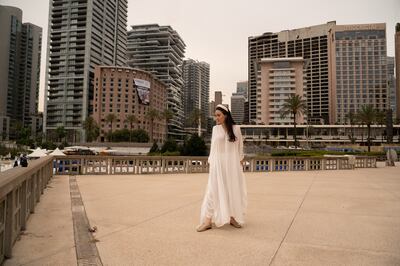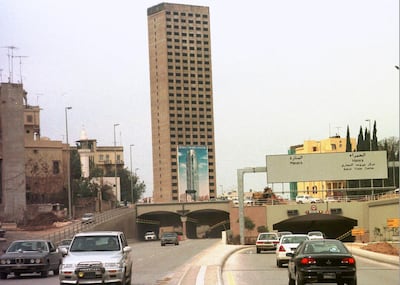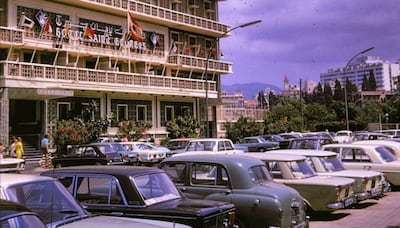When Beirut singer-songwriter and architectural researcher Mayssa Jallad wrote her historic preservation master’s thesis, turning it into a music album wasn’t part of the plan.
Released earlier this year and launching a new vinyl edition in January, Jallad’s first solo album Marjaa: The Battle of the Hotels, is a fusion of her two passions, drawing directly on her thesis to give voice to a little-researched part of the Lebanese Civil War (1975-1990), personifying the now abandoned buildings in Beirut’s hotel district.
Growing up in Beirut, Jallad spent years as part of the indie band Safar, singing and writing music alongside studies for her undergrad degree in architecture at the American University of Beirut. She then moved to New York to further her education, where she began delving into the Battle of the Hotels, a five-month subconflict that began on October 22, 1975, and reshaped Beirut’s Minet El-Hosn area.
“I have this obsession with old buildings in Beirut and their architectural history, that tells us so much about the history of the city, which no one really talks about; especially the history of violence that the city has seen,” Jallad tells The National. “My thesis was about figuring out what to do with existing buildings, what heritage is and how to define the significance of a building, which led to me the Battle of the Hotels.

“I went into the events day by day, all the buildings that were invaded – some of which were destroyed – and I felt I was rediscovering my city through writing about this difficult period in time,” she adds.
“After graduation, I went into a job in the middle of New York's financial district. Over the course of that year I felt like I was slowly losing my purpose in life and I wasn't able to write music at all. I wasn't able to use this knowledge in my thesis for anything. One day, I decided I would quit my job in New York, come back to Beirut and write an album about my thesis.”
Written in collaboration with producer Fadi Tabbal and mastered by Heba Kadry, the album tells the story of the world’s first urban high-rise battle, with each track embodying a different event in the conflict or hotel that became a protagonist in the tragic events, the once-opulent hotels repurposed as command posts, strongholds and sniper’s nests.
Jallad also notes the significance of hotels being used for urban warfare as examples of architecture that has backfired against its original purpose: buildings intended as welcoming symbols of optimism and progress instead being targeted because of their size, high walls and perfect views, making them ideal sniper’s nests.

The 12-track record blends Arabic blues with folk, synth, oud and electronic elements with field-recorded soundbites of traffic or thuds that sound like distant gunfire. Jallad’s incredible vocals chronicle what storied buildings such the Holiday Inn, Burj El Murr and Haigazian University witnessed during the war.
“It started with an attempt to invade the Central Bank and then moved east to the hotel district, which was a luxurious symbol of the golden age,” Jallad says. “The invasion of the hotels happened between two warring factions, which were the left-wing Lebanese National Movement and the right-wing Christian Lebanese Front. I have called them in my song the Reds and the Blues [respectively.]
“The first four tracks talk about a general feeling that I have in Beirut. Empty skyscrapers remind me simultaneously of the violent past that I studied and of the violence of real estate, because after the war this hotel district became full of super shiny skyscrapers,” she says. “The next tracks go into embodying each building. I start with Haigazian University, which is where the Blues were hiding to attempt the attack on the Central Bank, then I have a track for Burj El Murr, which was a skyscraper under construction that the Reds decided to invade and make a sniper's nest.”
Two tracks are dedicated to the Holiday Inn, a colossal 1,000-room hotel that became the counter-offensive base for the Reds, targeting the Blues in Burj El Murr.

Today, some, like the Phoenicia Hotel and Palm Beach Hotel have been restored and rebuilt, or repurposed like the Alcazar Hotel – now a bank. The Hilton and the Normandy were demolished by Lebanese company Solidere after the war and the Holiday Inn, the St Georges Hotel and Burj El Murr are still derelict, like looming spectres in Beirut’s fancy upmarket area.
The final track, Al Irth, alludes to Lebanon’s current misfortunes – still mired in sectarian issues that the Taif Agreement failed to resolve and the history erased by Solidere’s post-war reconstruction projects.
The lyrics, “But the war did not end / The war will not end / As long as we vote for the Reds and Blues”, are a call to end the cycle of corruption and violence still present today.
The limited vinyl edition of Marjaa, co-released by Beirut label Ruptured and UK newcomer Six of Swords, will be launched at Dar El Nimer in Beirut in January. The new edition will include maps and a timeline of the historic events, to help people unfamiliar with the city and Civil War grasp how it unfolded.
This month, Jallad has embarked on a short tour of Europe, stopping at Oslo World Festival, Zoart in Brussels and Le Guess Who? festival in The Netherlands, to perform the album.






